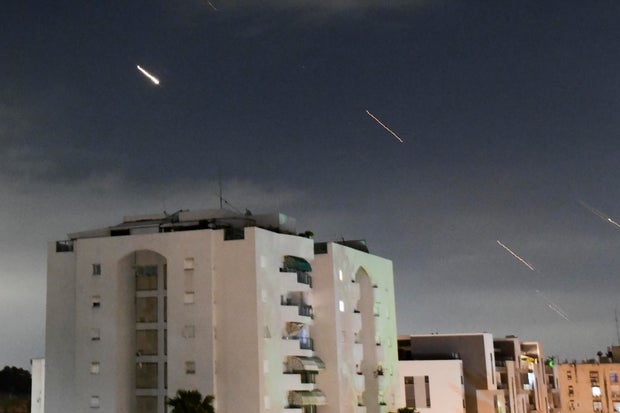[ad_1]
Air raid sirens and loud booms sounded across Israel as Iran on Saturday evening launched dozens of drones and missiles at Israel in a retaliatory attack, Israeli authorities said.
Over 200 missiles and drones were fired from Iran towards Israel, Israel Defense Forces spokesperson Daniel Hagari reported, saying that the vast majority were intercepted. Hagari, though, indicated an unknown number of missiles fell in Israeli territory. He said at least one child was wounded in the attack.
The IDF stated in a separate social media post there were some injuries from the Iranian-launched missiles, including at a military base in southern Israel, but no further details were immediately provided.
Israel had closed its airspace at midnight and fully activated its air defense systems ahead of the aerial assault. It took several hours before the drones reached Israeli airspace. Alerts started to sound across Israel close to 2 a.m. local time Sunday, the IDF said. Alarms went off in southern Israel, by the Dead Sea, in Jerusalem, and the Shomron area.
Tomer Neuberg / AP
“The IDF Aerial Defense Array is on high alert, along with IAF fighter jets and Israeli Navy vessels that are on a defense mission in Israeli airspace,” the IDF said in a statement earlier Saturday. “The IDF is monitoring all targets.”
In a statement released late Saturday night, President Biden said he condemns the Iranian attack “in the strongest possible terms” and acknowledged that the U.S. “helped Israel take down nearly all of the incoming drones and missiles.”
U.S. forces “intercepted dozens of of missiles and UAVs en route to Israel, launched from Iran, Iraq, Syria and Yemen,” Defense Secretary Lloyd Austin said in his own statement.
U.S. warships shot down Iranian-launched missiles headed towards Israel, two U.S. officials told CBS News.
The president disclosed that over the last week, U.S. forces had “moved aircraft and ballistic missile defense destroyers to the region” in anticipation of the attack.
Iran’s attack comes in retaliation for an April 1 Israeli strike on an Iranian consulate in Damascus, Syria, which killed seven members of the Islamic Revolutionary Guard Corps.
ATTA KENARE/AFP via Getty Images
Mr. Biden had returned to the White House on Saturday in preparation for what was believed to be an imminent attack. Following a lengthy meeting with the National Security Council, Mr. Biden spoke by phone with Israeli Prime Minister Benjamin Netanyahu Saturday evening.
In his statement, Mr. Biden said that, in his conversation with Netanyahu, he reaffirmed “America’s ironclad commitment to the security of Israel,” and told Netanyahu “that Israel demonstrated a remarkable capacity to defend against and defeat even unprecedented attacks.”
The president said he will convene a meeting Sunday with G7 leaders “to coordinate a united diplomatic response to Iran’s brazen attack.”
Michael Herzog, Israeli ambassador to the U.S., wrote on social media that Iran “must be held accountable” for Saturday’s actions.
Adam Schultz/The White House via AP
The U.S. is on standby for further action by Iran, and from within the region via its proxies, a U.S. official told CBS News. It is positioned to be able to shoot down incoming drones from Iran via assets in Iraq and Syria, three U.S. officials told CBS News. The U.S. also has fighter jets that are now on standby.
The U.S. assets were in addition to Navy destroyer USS Carney remaining in the central Mediterranean to provide additional protection if needed instead of heading West, and the destroyer USS Arleigh Burke remaining in the eastern Mediterranean, where it has been for a while, CBS News learned.
The U.S. preference is for the Israeli government to wait and assess the impact of the Iranian reprisal before responding to it, a U.S. official told CBS News. The U.S. preference is for a calibrated response. The expectation is that the Israelis will calibrate based on whether it successfully intercepts Iranian incoming missiles and drones, and whether or not there are any casualties.
Netanyahu convened his war cabinet in Tel Aviv after he issued a video address Saturday night, saying, “In recent years, and even more so in recent weeks, Israel has been preparing for the possibility of a direct attack from Iran. Our defense systems are deployed, we are prepared for any scenario, both in defense and attack. The state of Israel is strong, the IDF is strong, the public is strong.”
Israeli Government Press Office / Handout/Anadolu via Getty Images
In a statement, the IRGC acknowledged that attack, saying Iran had “launched a punitive strike against the occupied territories.”
“This operation involved the use of both missiles and drones,” the IRGC acknowledged.
Iran’s mission to the United Nations said on social media the attack was in response to the strike in Syria and that, “the matter can be deemed concluded. However, should the Israeli regime make another mistake, Iran’s response will be considerably more severe.”
The mission added; “It is a conflict between Iran and the rogue Israeli regime, from which the U.S. MUST STAY AWAY!”
A U.S. official in the region told CBS News that anything that passes over Jordanian territory is a problem and will be intercepted.
The British had scrambled jets from Cyprus, a U.K. official also confirmed to CBS News. Britain’s defense ministry later said in a statement that it had moved additional fighter jets and air refueling tankers to the region.
“These UK jets will intercept any airborne attacks within range of our existing missions, as required,” the defense ministry said.
Ahead of the attack, earlier Saturday, the Israel Home Front Command issued guidelines limiting gathering to a maximum of 1,000 people. All schools were ordered closed through at least Monday, even though nearly all schools will be closed anyway next week for the Passover holiday. People were advised to remain near safe rooms and shelters. The workweek in Israel runs from Sunday through Thursday.
On Friday, Mr. Biden urged Iran not to move forward, saying his message to Tehran was: “Don’t.” Earlier in the week the U.S. sent a senior general to Israel to coordinate with the close American ally on any response it might make to an Iranian attack.
British Prime Minister Rishi Sunak issued a statement condemning Iran’s drone attack “in the strongest terms.”
Josep Borrell, European Union foreign affairs chief, said in a social media post that the EU “strongly condemns the unacceptable Iranian attack against Israel, and calling it “an unprecedented escalation and a grave threat to regional security.”
Tensions in the region, however, continued to rise. Earlier Saturday, commandos from special forces unit of Iran’s paramilitary Revolutionary Guard seized an Israeli-affiliated container ship near the Strait of Hormuz.
The U.S. government called on Iran to release the vessel and its international crew immediately. “Seizing a civilian vessel without provocation is a blatant violation of international law,” said National Security Council spokesperson Adrienne Watson. “It must be condemned unequivocally, and we will work with our partners to hold Iran to account for its actions.”
All U.S. embassies in the Middle East were put on high alert and required to hold emergency action committee meetings. Diplomats in Lebanon and Israel were specifically told not to travel to certain areas within those countries.
Earlier in the day Lebanon launched missiles toward northern Israel. State media reported Jordan has closed its airspace “in light of the escalating risks in the region,” and declared a state of emergency.
Two U.S. officials had told CBS News Friday that a major Iranian attack against Israel was expected imminently, possibly to include more than 100 drones and dozens of missiles aimed at military targets inside the country. Sources had told CBS News the retaliation could include attacks carried out both by Iranian forces, and proxy groups around the region that it has been funneling additional arms to for weeks.
The U.S. State Department on Thursday warned Americans in Israel not to travel outside major cities, which are better protected from incoming rocket fire by the country’s Iron Dome missile defense system.
— Margaret Brennan, Eleanor Watson, Debora Patta and Tucker Reals contributed to this report.
[ad_2]
Source





Leave a Reply